Dubai Sehri and Iftar Timings 2023 Guide
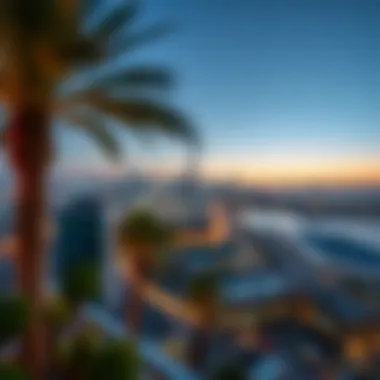

Intro
As the sun dips below the horizon and the call to prayer echoes through the bustling streets, Dubai transforms into a tapestry of vibrant flavors and communal warmth. During the holy month of Ramadan in 2023, the city pulses with the sacred rhythm of Sehri and Iftar, marking the start and end of daily fasting. These periods are not merely times for meals; they hold profound significance, connecting individuals to their faith, family, and community.
For those living in or visiting Dubai, understanding the timings for Sehri (the pre-dawn meal) and Iftar (the evening meal breaking the fast) offers more than just practical information. It reflects the cultural fabric woven by the diverse communities inhabiting the city. In this guide, we'll delve into the current Sehri and Iftar times for 2023, explore how these practices shape daily life, and highlight some of the unique locations that enhance the experience. These insights will not only assist residents and tourists in planning their days but also deepen their appreciation of Ramadan's themes of reflection, gratitude, and community.
Understanding Islamic Fasting
Fasting is not just an act of abstaining from food and drink; it is a spiritual cleanse that invites deeper reflection and self-discipline. In this article, we delve into its importance, specifically during Ramadan, as it relates to the Sehri and Iftar timings in Dubai for 2023. Understanding Islamic fasting unveils its rich significance while considering the cultural context of a city known for its vibrant traditions and expat communities.
The Significance of Ramadan
Ramadan, the ninth month of the Islamic lunar calendar, is a period marked by the revelation of the Quran. For Muslims, it is a time of heightened devotion, self-restraint, and community spirit. The act of fasting during this month promotes not only spiritual growth but also a sense of shared experience among peers whether they are residents or visitors in Dubai.
- Self-Discipline: One of the foremost benefits of fasting is developing self-control. This is especially pertinent in a fast-paced city like Dubai where temptations are around every corner.
- Empathy for the Less Fortunate: Fasting instills compassion, driving home the importance of charity and helping those in need. The act of sharing Iftar meals extends a bridge of kindness across diverse social groups.
- Spiritual Reflection: Ramadan presents a unique opportunity for Muslims to deepen their connection with their faith, enhancing their understanding of the Quran and their relationship with God.
Fasting Practices and Its Benefits
Engaging in fasting transcends mere abstention from food and drink. It embodies a holistic approach to bettering oneself physically, mentally, and spiritually.
- Physical Benefits: Studies suggest that fasting can lead to improved metabolic health. In a city bustling with culinary offerings, mindful eating during Sehri and Iftar can promote healthier lifestyle choices.
- Mental Clarity: Many find that fasting enhances focus and clarity, allowing individuals to approach their daily duties with renewed zeal. As the sun sets, the anticipation of Iftar creates moments of joy that strengthen community bonds.
- Strengthened Community Ties: Breaking fast together at sunset fosters connections among family members and friends. These gatherings can be found in homes, parks, or local mosques, showcasing Dubai’s commitment to inclusivity. Every meal shared not only nourishes the body but also reinforces the fabric of society.
In summary, understanding Islamic fasting provides invaluable insights into both personal growth and communal cohesion during the holy month of Ramadan. The unique blend of spirituality and social connections shapes experiences not only for Muslims but for the diverse populations residing in Dubai. This exploration serves as a backdrop to the upcoming sections detailing specific Sehri and Iftar times as well as their impact on the daily lives of many.
Sehri and Iftar Overview
The rituals of sehri and iftar stand as the backbone of Ramadan, acting as bookends to each fasting day. In Dubai, where the rhythm of life pulses with energy, these moments offer a unique glimpse into the traditions and community cohesion of its residents. The observance of these two significant meals serves not only to break the fast but also to foster a sense of belonging and unity among participants.
During Ramadan, the pre-dawn meal, known as sehri, is the last opportunity for individuals to consume food and drink in preparation for a day of fasting. Conversely, iftar is the moment when the fast is broken at sunset, marking a time for families, friends, and communities to gather and share a meal. The social implications of these practices are profound, promoting interaction and camaraderie across diverse cultures present in Dubai.
Significance of Sehri and Iftar
- Sehri isn’t just about food; it’s a reminder of spiritual fortitude. Many individuals find prayer and reflection in those early morning moments, setting a tone of dedication for the day ahead.
- Iftar, on the other hand, captures the essence of hospitality and generosity. There’s a strong emphasis on providing for others, emphasizing the importance of philanthropy and community support during Ramadan.
The timing of these meals shifts daily throughout the month, urging participants to remain mindful of the clock and the changing seasons. This aspect of the experience, while seemingly simple, has lasting effects, as individuals adapt their routines to embrace these sacred practices.
The connection between the two meals is undeniable. As the sun dips below the horizon, the focus is on gratitude for the sustenance that has been provided throughout the day. Moreover, it’s a moment to appreciate the shared experiences and collective memories forged in the act of breaking the fast together.
In this way, sehri and iftar in Dubai become more than just meals; they illustrate a communal spirit, encapsulating the heart of Ramadan and serving as a reminder of the importance of togetherness in a world often marked by haste and individualism.
"Ramadan is a time to purify the soul, refocus attention on God, and practice self-discipline and sacrifice." This perspective resonates deeply during sehri and iftar, where the act of sharing food translates into a wider abstract of sharing love and support.
As we delve deeper into the details of these practices, understanding their significance in daily life during Ramadan becomes essential, not just for those who celebrate but for anyone engaging with the rich tapestry of culture that defines Dubai.
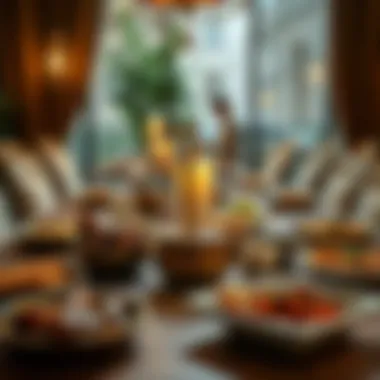
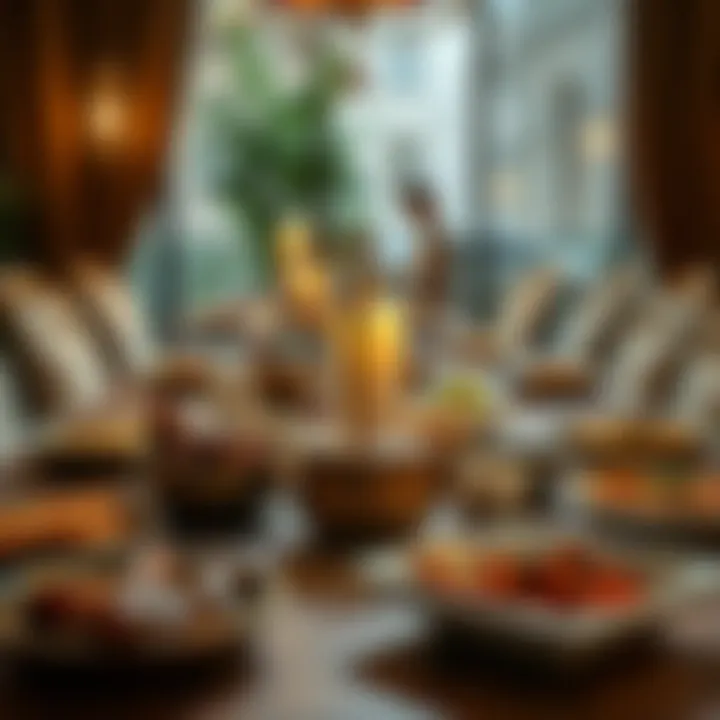
Sehri Time in Dubai
Sehri, the pre-dawn meal observed by Muslims during Ramadan, holds great significance for those observing the fast. It’s not just about nutrition; it’s a ritual that sets the tone for the day ahead. In Dubai, a city known for its fast-paced lifestyle and bustling multi-cultural environment, the timing and practices surrounding Sehri can greatly influence daily activities and well-being. Understanding the intricacies of Sehri time in Dubai is pivotal for both residents and visitors during this holy month.
Daily Sehri Timings
In 2023, the Sehri timings can vary slightly from day to day, which adds a layer of planning to the meal. In general, the meal should be consumed before the Fajr (dawn) prayer, which marks the beginning of the fast. Residents of Dubai need to tune their alarms, ensuring they wake up in ample time to eat, hydrate, and perhaps pray.
For instance, during the initial days of Ramadan, Sehri might be around 4:30 AM, while later in the month, it could shift to around 4:15 AM as the days lengthen. The table below highlights an approximate schedule for Sehri times in Dubai in 2023:
| Date | Sehri Time (Approx) | | April 23 | 4:30 AM | | April 24 | 4:29 AM | | April 25 | 4:28 AM | | April 26 | 4:27 AM | | | | | May 20 | 4:15 AM |
Impact of Sehri on Daily Routine
Sehri plays a profound role in shaping daily routines during Ramadan. As the sun rises and the bustle of the day begins, those who eat Sehri often feel gratitude for the early start and the opportunity it provides to reflect.
This meal, albeit early, can positively impact focus and mood. Starting the day with nourishing food and water helps maintain energy levels, which are essential for those balancing work and spiritual practices. Many people in Dubai find themselves adjusting their schedules around this meal, resulting in altered sleeping patterns, increased social gatherings, and even changes in workplace dynamics.
- Social Aspect: Families often come together for Sehri, enhancing a sense of community. Those who usually work late have a chance to bond over this meal.
- Mental Clarity: A nutritious Sehri contributes to mental alertness, necessary for performing tasks throughout the day.
- Hydration Awareness: Drinking water during Sehri highlights the importance of hydration. Many people take this opportunity to prepare their bodies to cope with the day ahead.
It's clear that Sehri is more than just a meal; it's a practice that threads through the fabric of Ramadan, influencing how individuals approach everything from their jobs to their families. Understanding its importance enhances the Ramadan experience, especially in a cosmopolitan hub like Dubai.
Iftar Time in Dubai
Iftar is more than just a meal; it’s a celebrated moment when the sun sets, marking the end of the daily fast during Ramadan. Understanding the Iftar time in Dubai during 2023 is crucial for residents and visitors alike. It serves as a reminder of the communal aspect of Ramadan, uniting individuals and families as they come together to break their fast. The timing enhances the spiritual experience, allowing participants to reflect on their day and express gratitude for the sustenance they receive.
Timing varies slightly each day, guided by the attributes of the lunar calendar, making it essential for Muslims to be aware of when the call to prayer, or the adhan, occurs. Knowing the Iftar times ensures that the meal is taken right at dusk, sometimes prompting people to gather in anticipation, showing the importance of this practice in fostering unity and family bonds across the city.
Daily Iftar Timings
Daily Iftar timings reveal the beauty of Ramadan’s rhythm in Dubai. For 2023, the Iftar time generally starts around 6:19 PM at the beginning of Ramadan, gradually shifting to approximately 6:24 PM by the end of the month. It’s something akin to a dance as the sun kisses the horizon, with anticipation building as the clock ticks down.
- Beginning of Ramadan: Iftar around 6:19 PM
- Mid-Ramadan: Iftar around 6:22 PM
- End of Ramadan: Iftar around 6:24 PM
Information on these timings can often be found through local mosques or community centers, ensuring that everyone is aligned just in time to say "Bismillah"—in the name of God—before their first bite after a long day of fasting. This timing ritual plays a significant role, prompting reflections and allowing families to bond over shared meals.
Social Aspects of Iftar
The social aspects of Iftar elevate the experience beyond mere sustenance. In Dubai, it turns into a celebration of community and shared experiences. Friends and families often host or attend Iftar gatherings, and many individuals will invite their neighbors, regardless of dietary practices, highlighting the inclusiveness of this sacred month.
"Sharing food is a universal language; during Ramadan, it’s a heartfelt expression of hospitality that transcends boundaries."
Not only are these gatherings about breaking bread, but they also become a space for storytelling and cultural exchange. In public venues, such as parks and community centers, large gatherings emerge as families set out lavish spreads to share with anyone who may be in the vicinity. It’s a reminder that Ramadan enforces gratitude and compassion, reinforcing the essence of giving.
The diversity of the city enhances the Iftar experience as restaurants and cafes gear up to offer special menus featuring traditional dishes from various cultures. From Middle Eastern delicacies like Hummus and Shawarma to Asian-inspired savory delights, the culinary landscape reflects the multicultural tapestry of Dubai. Community events during this time are often centered around charitable causes, further solidifying the connection amongst residents and visitors.
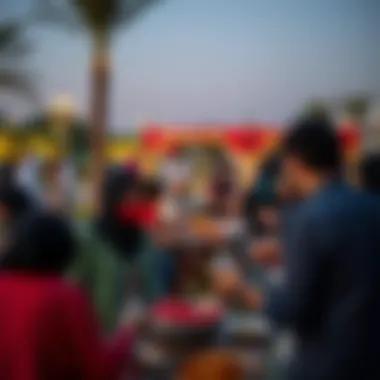
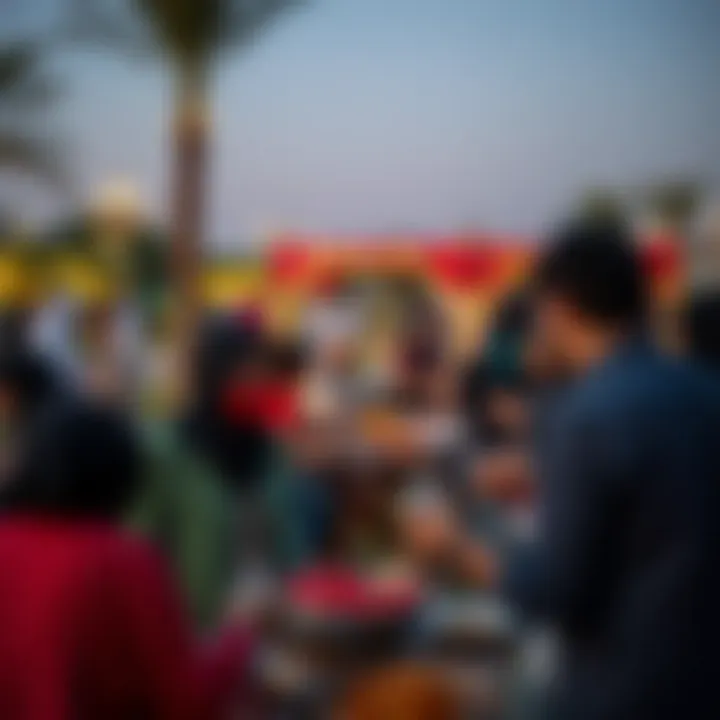
In summary, Iftar time in Dubai is fundamental not just for its timing, but for how it enriches social fabric, evokes camaraderie, and shares the joy of breaking the fast with others. Like a well-prepared iftar spread, it encompasses a variety of flavors, highlighting the vibrant culture enveloping this holy month.
Cultural Significance of Sehri and Iftar
During the holy month of Ramadan, Sehri and Iftar constitute significant rituals for Muslims, melding spirituality with community engagement. These practices are not just about fasting and breaking bread; they embody a rich tapestry of tradition, belonging, and cultural identity within the diverse expanse of Dubai. The attention given to these rituals reflects their importance in forging connections among family, friends, and the broader community.
Community and Togetherness
The community aspect of Sehri and Iftar cannot be overstated. When the sun sets and the call to prayer resonates throughout the city, homes and mosques alike become bustling hubs of activity. Families gather around the table, sharing meals that often feature traditional dishes like dates, lentil soup, and various meat preparations, often passed down through generations.
For many expatriates, this communal feeling may be a lifeline, especially as they navigate their lives in a foreign land. Shared meals foster conversations that deepen relationships, and many take it a step further by inviting neighbors and friends to join in the festivities. This promotes a sense of belonging and community spirit, vital for enhancing the social fabric during Ramadan.
"Breaking fast together fosters bonds that often transcend cultural boundaries."
Diverse Traditions in Dubai
Dubai's unique tapestry of cultures enriches the celebration of Ramadan. With an expat population hailing from all corners of the globe, Iftar presents an opportunity to discover various culinary traditions. For instance, a Lebanese family might serve a hearty spread of tabbouleh and kebabs, while a Pakistani family might delight in biryani and samosas. Each meal tells a story and reflects the heritage of those preparing it, and thus, the diversity extends beyond just the food.
Local restaurants and hotels are equally attuned to this melting pot. Many offer Iftar buffets that feature regional and global cuisines, making the experience inclusive and immersive. Here, one can savor Thai soups alongside Emirati majboos, highlighting how Ramadan becomes a canvas for cultural exchange.
Moreover, community iftars in public spaces promote a wider connection, allowing individuals from different backgrounds to gather, share, and learn from one another. This interaction fosters understanding and mutual respect among the diverse population, reinforcing Dubai's reputation as a city of tolerance.
Best Places for Iftar in Dubai
During Ramadan, the act of breaking the fast becomes more than just a meal; it transforms into an event rich with tradition, community, and culture. Choosing the right place for Iftar in Dubai is vital for anyone looking to savor this moment. The selection of a dining venue can significantly impact the experience, ensuring not only delicious food but also a welcoming atmosphere where families and friends can gather after a long day of fasting.
Dubai’s culinary landscape is a picturesque mosaic, blending flavors from across the globe, which enhances the Iftar experience. From lavish buffets to culturally immersive gatherings, there are plenty of choices that cater to diverse preferences. Visitors and residents alike should consider a few aspects when selecting an Iftar venue, such as the ambiance, variety of dishes offered, and of course, the convenience of location.
Great Iftar spots also help foster connections among families, friends, and even strangers, making it an ideal time for socializing and sharing stories. Dining together during Iftar promotes community spirit and solidarity, two pillars that make Ramadan so special.
Top Restaurants Offering Iftar Buffets
The lavish Iftar buffets at some of Dubai’s top restaurants not only provide a sensory feast but do so in settings that amplify the spirit of the month.
- At.mosphere, Burj Khalifa: Located on the 122nd floor of the world's tallest building, this venue combines breathtaking views with an extravagant buffet. The diverse spread includes traditional Arabic dishes alongside international favorites.
- Al Hadheerah, Bab Al Shams Desert Resort: Experience a different take on Iftar in the magical desert setting. Diners can treat themselves to a buffet of authentic Emirati cuisine while enjoying traditional entertainment such as Tanoura dance.
- The Arabian Tea House: For a more laid-back vibe, this charming establishment offers a variety of traditional dishes in an inviting courtyard. Their Iftar includes mezze and fresh juices, turning the meal into a nostalgic journey of flavors.
- Souk Bab Al Shams: A well-rounded spot where guests can indulge in over 20 traditional Iftar dishes presented in an Arabic-style setting. A good blend of foods ensures something for everyone.
These places are just the tip of the iceberg, as many more restaurants offer unique dining experiences tailored for Iftar.
Cultural Venues for Iftar Experience
Opting for cultural venues for Iftar can enrich the experience considerably. These places not only focus on food but also emphasize the essence of Ramadan traditions.
- Sheikh Mohammed Centre for Cultural Understanding: This venue hosts a unique Iftar experience where guests can enjoy traditional dishes while learning about Emirati culture. It fosters open dialogue and cultural exchange, bridging gaps between communities.
- Dubai Opera: For those who appreciate the arts, Dubai Opera often curates special Iftar events that combine gourmet dining with classical performances, offering a richer sensory experience.
- Cultural City Event Spaces: Several cultural hubs throughout the city offer Iftar programs that include local artists, storytelling, and crafts. These events make for an immersive experience, allowing attendees to engage in the traditions of Ramadan.
Health Considerations during Ramadan
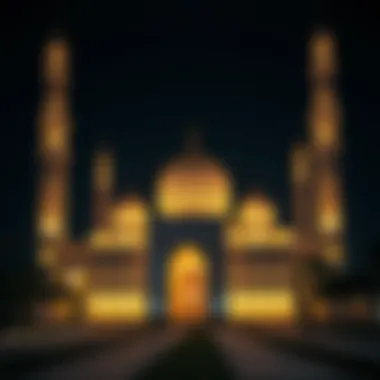
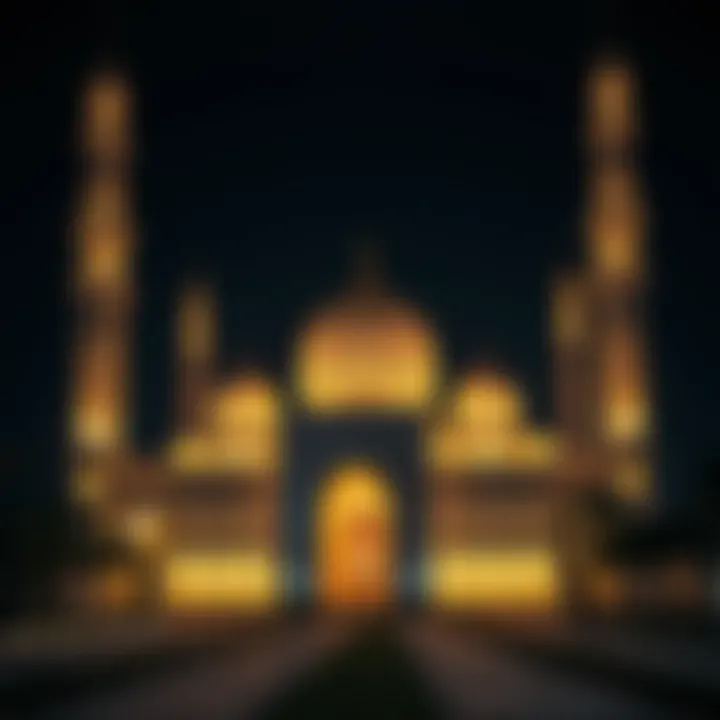
During Ramadan, the rhythm of life shifts dramatically, particularly for those who engage in fasting. Understanding the health considerations associated with Sehri and Iftar is crucial, especially for individuals living in dynamic cities like Dubai, where the high temperatures and lifestyle can influence well-being. This section addresses vital aspects of nutrition and hydration, which can make all the difference in ensuring a healthy fasting experience.
Nutrition Tips for Sehri and Iftar
When it comes to Sehri and Iftar, the meals play an essential role in sustaining energy levels and maintaining health throughout the day. Here are some effective tips for optimizing your nutrition during these times:
- Balanced Meals: Incorporate a variety of food groups. Aim for a mix of carbohydrates, proteins, and healthy fats. For example, pairing whole grain bread with eggs and avocado can provide sustained energy.
- Complex Carbohydrates: Foods like oats, quinoa, and brown rice break down slowly, helping you feel full longer and maintain your energy.
- Fruits and Vegetables: Adding fruits like bananas or vegetables like spinach not only provides essential vitamins but also assists in digestion.
- Avoid Processed Foods: While it can be tempting to indulge in sweets or fried snacks after fasting, such options may lead to quick energy crashes. Instead, opt for homemade fresh dishes.
- Small Portions: At Iftar, it’s wise to start with dates and water to gently reintroduce food. This can help your digestive system start working again comfortably before diving into larger portions.
"Eating a balanced meal enhances not only physical energy but also mental acuity, essential for managing daily tasks."
Managing Hydration
Staying hydrated during Ramadan can be particularly challenging given the arid climate of Dubai. However, smart strategies can help ensure you remain hydrated throughout the month:
- Drink Plenty of Water: Aim to drink at least 8 cups of water between Iftar and Sehri. Consider setting reminders to ensure you don't forget to hydrate.
- Limit Caffeinated Beverages: Coffee and tea can lead to increased urination, which may cause dehydration. Instead, try herbal teas or simply water infused with lemon or mint.
- Foods with High Water Content: Incorporate foods rich in water into your diet, such as cucumbers, tomatoes, and watermelon, which can assist in hydration.
- Avoid Overeating at Iftar: Excessive consumption of salty foods can lead to dehydration. Try to balance salt intake and enjoy wholesome foods that restore electrolytes without overwhelming your body.
Ramadan Activities in Dubai
During the month of Ramadan, Dubai transforms into a vibrant hub of cultural and spiritual activities. The significance of these activities goes beyond mere observation; they cultivate a sense of community and strengthen bonds among residents and visitors alike. In addition to the standard Sehri and Iftar practices, a plethora of events enhance the overall experience of this sacred month.
Community Events During Ramadan
The community events in Dubai during Ramadan hold immense significance, serving as a platform for social connection and cultural exchange. From spiritual lectures and Quran recitations to charity events, there is something for everyone.
- Spiritual Gatherings: Mosques across the city offer special evening lectures focusing on various aspects of spirituality and brotherhood. These sessions invite both Muslims and non-Muslims to learn about the essence of Ramadan.
- Charity Initiatives: Numerous organizations launch food drives and fundraisers, ensuring that those in need are remembered during this season of reflection and giving. Individuals often volunteer their time and resources, fostering a spirit of generosity and community care.
- Cultural Programs: Events showcasing traditional music, art, and poetry come alive during Ramadan nights. These programs not only entertain but also educate attendees about the rich heritage of Islamic culture.
A popular venue is the Dubai World Trade Centre, where many of these events take place, often drawing large crowds and diverse participants.
Shopping and Iftar Promotions
Retailers in Dubai capitalise on the spirit of giving and togetherness, creating unique promotions during Ramadan, especially around Sehri and Iftar.
- Ramadan Marketplaces: Temporary markets bloom in various locales, offering traditional foods, clothing, and artisanal crafts. These marketplaces provide a local shopping experience, allowing visitors to immerse themselves in the local culture.
- Dining Offers: Many restaurants introduce special Iftar menus at attractive prices. You’ll find gourmet buffets ranging from Middle Eastern delights to international cuisines designed to cater to a wide audience.
- Discounts and Packages: Local businesses often pump up their sales strategies with discounts, targeted campaigns leading up to Ramadan. Customers can take advantage of deals on everything from clothing to household items.
“Ramadan is not just a month of fasting; it’s an opportunity for growth, both spiritually and communally.”
In summary, activities during Ramadan in Dubai present a multifaceted experience for both residents and visitors. They elevate the cultural experience significantly, ensuring that auspicious moments are not only observed in solitude but celebrated with friends, family, and the broader community.
The End
Reflecting on the significance of Ramadan in Dubai unveils a tapestry of cultural vibrancy and communal spirit. Throughout this article, we have delved into the intricacies of sewri and iftar times, illustrating how these daily rituals shape both individual and collective experiences. The timing of sehri and iftar is not merely a matter of routine; it is a cultural touchstone that unites friends and families in observance of faith and tradition.
As the holy month unfolds, having a clear understanding of the sehri and iftar timings becomes essential. For expatriates, seasonal visitors, or even local residents, knowing when to eat allows for seamless integration into the festive rhythm of Ramadan. Many find that the time spent together at iftar fosters relationships, creates lasting memories, and strengthens community bonds.
Moreover, exploring the best places to break fast, whether it is a lavish hotel buffet or a cozy community gathering, adds layers to the Ramadan experience, quite literally offering a feast for the senses. This is particularly pertinent in Dubai, where culinary diversity mirrors its own multicultural populace.
In summary, the importance of understanding the nuances surrounding sehri and iftar during Ramadan in Dubai cannot be overstated. It enhances not only the spiritual journey of fasting but also enriches one’s interaction with the vibrant, ever-changing landscape of this amazing city.
"Fasting is not just about abstaining from food; it's a holistic experience that nourishes the soul."
This guide serves to authorize both residents and tourists alike to partake in and honor these time-honored traditions, cultivating a richer understanding and appreciation of Ramadan’s true essence.











